MRRL Hall of Fame
WHITE LINES
- Details
- Category: Inductees
- Created: Friday, 02 June 2017 08:06
- Written by Gary Johnson
Thirty-seven years after the end of the White Lines, Joe Kidd looked back at what he calls "the best and worst job I ever had." He remembered how difficult it was being in a rock and roll band: dragging heavy equipment to gigs, trying to find a truck to haul it, putting up with bar owners, and keeping the band sober enough to play the gigs. But being on stage with the amps buzzing and the speakers blasting made everything worthwhile. Even though he would never describe himself as an organized person, he claimed he was the most organized person in the White Lines. "We were not pretty boys", Joe stated, "the White Lines were more of a heroic band in that we made statements like the Clash and the Beatles, two of our musical heroes."
Joe Kidd was born in Detroit in 1952 at St. Joseph’s Hospital. His father, John, was a refrigeration engineer and his mother, Evelyn, was a housewife. In our interview, Joe stated that his dad couldn’t carry a tune in a bag but his mother was a great singer who was born in southeast Kentucky in the small town of Barbourville. She had two other sisters, and they sang country music featuring their sisterly harmonies at family gatherings or anytime they got together. Joe’s uncle was a guitar player in a country band who toured around and he stayed with Joe’s family in Detroit for a couple of summers. He was the one who taught Joe and his younger brother John (a.k.a. Killer Wail) their first guitar chords.
Joe and his brother weren’t that interested in guitar at that point, however, despite getting encouragement from family members to play and sing like the Everly Brothers. That all changed in 1964 when the Beatles hit big in the United States. Both Joe and Killer became transfixed by the Fab Four and didn’t want to listen to anything else at the time. Joe recalled that it got to the point that his mother took away their “Meet The Beatles” album because she thought the constant listening was going to make them ill.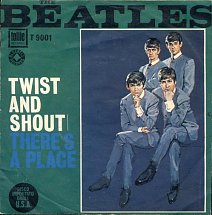 "There's A Place" 45
"There's A Place" 45
When the Beatles’ version of Twist and Shout came out on the Tollie label in March of 1964, with There’s A Place on the flipside, the record made quite an impression on Joe. “Those two songs say everything the Beatles ever wanted to say”, he stated. “Twist and Shout was probably the greatest rock and roll song ever performed, and There’s A Place, in my opinion, is the first psychedelic rock song ever written: “There’s a place where I can go… in my mind”, he sang. “It’s Lennon at twenty-three years-old talking about traveling through his own head. That record is the perfect bookend to everything the Beatles ever did…physically, spiritually, emotionally...the whole idea of love.”
Joe was interested in rock and roll before the Beatles. His mother was a big Elvis Presley fan, and the first rock and roll record he recalled seeing was her copy of Hound Dog. He remembered that he loved the dog (Nipper) on the RCA label. His mother didn’t make the connection between the harmonies of the Everly Brothers and their influence on the Beatles, however, and Joe theorized that she was frightened of the Beatles’ long hair and thought that her sons might become lost.
It probably didn’t help that whenever Joe did something out of line, his mother would tell him to go to his room, which he relished. He could then listen to his Beatles records and and sing Twist And Shout into an aluminum metal cup that he used as a microphone. Kidd claims it was how he learned to sing, and that he still sings the song today. At this point, Joe and his brother both wanted guitars; but there seemed to be no way that their parents were going to buy them or let the boys grow their hair long like the Beatles.
During Joe’s first year of high school, the family moved to Buena Park, California, the home of Knotts Berry Farm. He and his brother used to get $0.55 each day for lunch at school, but they had a secret plan and never spent a nickel. Instead of eating at school, they put their lunch money into a bag hidden in their closet to save toward guitars. Joe had been saving to buy a $50 Hi-Lo electric guitar and his brother for a twelve-string St. George model. They had seen both guitars in the window of a local music store. 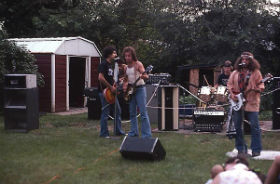 (L to R) Killer Wail, Pual Wilson, Mark Dowell, Joe Kidd
(L to R) Killer Wail, Pual Wilson, Mark Dowell, Joe Kidd
Their mother didn’t initially figure out what they were doing, but one day they discovered that the money they saved was missing from their room and that the jig was up. They didn’t say anything to their parents and just ignored it, but the next day there was no lunch money. That weekend, however, their parents took the boys to the music store and bought them the guitars they wanted. Although neither Joe nor his brother took lessons on guitar, they played constantly, learning chords and singing together in California.
The West Coast rock scene blossomed during the years that Joe’s family lived in California; The Doors, Jefferson Airplane, Buffalo Springfield, Big Brother and The Holding Company were just some of the bands that had nationwide hits. Joe recalled that Steppenwolf played at his high school. The family came back to Michigan during Joe’s senior year and he graduated from Wayne Memorial High School in Detroit in 1970.
Shortly after graduation, Joe got into a major disagreement with his father over the length of his hair, and was given the option of getting a haircut or leaving the house. Joe chose the latter and hitchhiked to Ohio where joined a traveling carnival, slept underneath the double Ferris wheel, and played guitar with the other carnies at night. During that time, he visited the Hullabaloo club in Mentor, Ohio, and got a chance to sing on stage with Joe Walsh in his band the James Gang.
After Joe returned to Michigan, he and his brother joined the White Panthers and lived for a time at the 'Hill House' at 1510 Hill Street in Ann Arbor. At the time they were there, John Sinclair was in prison on a marijuana conviction, and the MC5 had just moved to a new location in Hamburg, a small town north of Ann Arbor. The MC5 were heroes to Joe and Killer. The brothers used to argue about the revolution in that it seemed that the Beatles were so peaceful and the MC5 so radical. 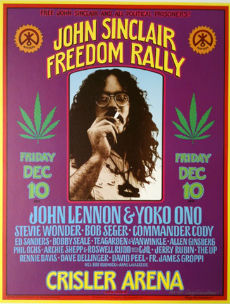
Joe and Killer were living in the house with members of the band Up. The Up was one of the bands that played at the John Sinclair Freedom Rally on December 10, 1971, at the Crisler Arena in Ann Arbor. Joe attended the rally that featured an appearance by John Lennon and Yoko Ono along with several other musical guests including Stevie Wonder, Commander Cody, and Bob Seger.
Looking back, Joe felt that the White Lines were a perfect mix of what the MC5 were doing and what the Beatles meant to them. Joe stated that the name ‘White Lines’ had nothing to do with the White Panthers nor was it a reference to cocaine. The name actually came from the band being on the road in a pickup truck, and Joe thought of the name as he watched the white lines pass by on the highway. It seemed like a good fit, signifying that they were “going somewhere”.
Joe stated that the band used several other names before, and even after, they adopted White Lines as their official moniker. Chief among these was the Silver Chords. Joe got that name from the idea of astral projection where your soul is connected to your body by the silver cord. He changed the name slightly to connect it with music, but said he never told the rest of the band exactly what the name meant.
The Silver Chords were basically a bar band that played in a variety of venues almost every night in the Detroit area. The band was doing a lot of drinking at that time and, as a result, changed their name to Old Number 7, a brand of Jack Daniel’s whiskey. They played mostly covers of David Bowie (“Watch That Man”, “Moonage Daydream”), Lynyrd Skynyrd (Gimme Three Steps”, “That Smell”), Grand Funk songs, and anything else that was popular during the 70’s. Joe and Killer were writing songs at that time but were not performing them live because the bars did not want original material. 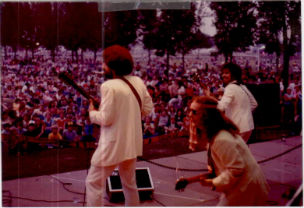 White Lines on stage
White Lines on stage
Chip Neumann was playing bass with them along with what Joe refers to as “a parade of drummers.” One of those drummers was Mark Dowell. Mark was born in Detroit in 1960. Mark’s parents were in the hair business – his father was a barber (Larry’s Barber Shop) and his mom was a beautician who worked in a number of different shops. He grew up in the area of 8 Mile and Telegraph near the border of Southfield. In the 1960s and 70’s, Detroit policemen and firemen had to live within the city limits. Mark’s area was the furthermost point you could live and still be in the city, so his neighborhood was made up of the families of many policemen and firemen. It was a very safe place to grow up.
Dowell’s father was also a musician. He played the sax in a rock and roll band on weekends, and had jammed with some members of the Funk Brothers at Detroit area clubs. Mark claimed that his father had an offer to join the band Chicago as one of their horn players, but he turned them down because he didn’t want to go on the road.
Mark was an only child and he liked the drums immediately. His father’s bands rehearsed in the basement, and at five years-old, inspired by Ringo Starr, he would sneak downstairs and beat on the drums and eventually learned to play by ear. He took up the sax in grade school – mainly because his dad wanted him to learn the instrument, but by junior high he concentrated on drums. 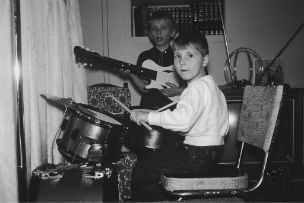 Young Mark Dowell on drums
Young Mark Dowell on drums
Dowell loved the Beatles right off. When he was five-years-old, he went with his parents to a showing of the Disney movie Fantasia. During a sequence when the orchestra was playing, young Mark got out of his theater seat and began singing She Loves You. His dad was a record buyer and bought all of Mark’s early 45s, but he wasn’t into the Beatles like his son.
As a teen, Mark attended Henry Ford High School in the west side of Detroit. He hung out at the Northland Roller Rink on 8 Mile. The dances were run by a DJ, playing the Top 40 hits, and everyone in the neighborhood went to the dances. By this time, he was more into album rock – early Santana, Grand Funk Railroad etc. Radio was still very important when Mark was a teen.
WABX was one of the big rock stations in Detroit in the 70’s. The DJs were called the “Air Aces” and they also had a mascot called Rocky the X-Pup, complete with a cape and superhero costume. The last year that WABX was on the air before changing formats, Mark got to play the role of Rocky on a day he was cruising around with a cousin in Heinz Park in the Livonia- Westland area. In the 70’s, all the locals went to party in Heinz Park and the police generally left the kids alone. He said didn’t get paid but he got some albums and concert tickets. All Mark had to do was put on the costume and spend a few hours walking around, passing out bumper stickers, and dancing with any willing ladies. He loved it! 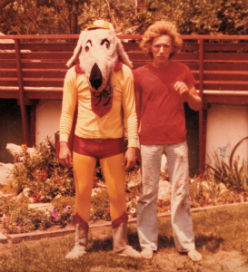 Dowell as Rocky the X-Pup
Dowell as Rocky the X-Pup
Mark's first performing experiences came in a few teen garage bands formed with neighborhood friends. They got some gigs playing parties and school dances, and covered songs by Grand Funk, the Doors, and other classic rock acts. He joined the Silver Chords after putting an ad in the Metro Times indicating that he was a drummer and was looking for a band. This was in 1978, the year after he graduated. Joe Kidd gave him a call. At the time, the Silver Chords were the house band at a bar called the Carriage Wheel, located near the border of Inkster and Garden City.
He drove to the club and played a few songs with the band, and joined later that day. What impressed Mark right off was that they were really heavy into the Beatles. He recalled that half of the Silver Chords' set were songs recorded by the Beatles, including tunes that they had covered like Bad Boy and Twist and Shout. Those songs fit comfortably into the power pop that was popular during the late 70’s and early 80’s. They also covered the Doors, Tom Petty and The Heartbreakers, and any other songs that got people up on the dance floor. 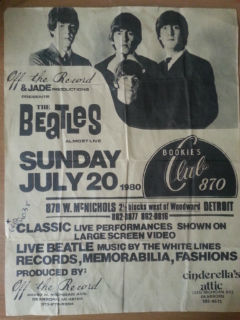 Honoring The Beatles
Honoring The Beatles
Joe and John’s father had passed away in 1972, and the brothers were staying with their mother, and the band rehearsed in the basement. Although they were inspired by the punks, they didn’t play much punk rock music. They continued to play Beatles’ songs, and even played some complete Beatle shows. They were not a tribute band, however, and never tried to dress the part. They tried to honor the Beatles, but Joe revealed that on occasion other bands gave them a hard time for performing Beatle songs, which sometimes resulted in fights. They played several times at the annual Beatlefest held each spring in Chicago. The band also did some gigs under different names including Instant Karma, Sunglasses At Night, and the Urban Guerillas.
John’s “Killer Wail” name was adopted during the late 70’s while they were still Old Number 7. The band wasn’t playing any originals at that point and were trying to get gigs wherever they could. Mark Dowell recalled that didn’t have a manager. They would either go to clubs with a cassette tape or rely on word of mouth to get gigs. Joe Kidd remembered that once they started playing regularly, they got a lot of phone calls from bar owners for gigs. It was a time when live music was in great demand.
They played at the Wagon Wheel, owned by Leo Speer, The Ranch on Telegraph Road, Lilli’s, Paycheck’s, The Bowery, and Bookie’s in Hamtramck, the Studio Lounge in Westland, and the Token Lounge in Livonia. They also played at the Funny Farm, The Ranch, Freestyle, and Tracks. Some of the other bands playing the circuit at that time included Benny & The Jets, The Mutants, Mugsy, Salem Witchcraft, and Destroy All Monsters. It was a good time for live music, and some of the more popular Detroit bands at that time, including the Romantics, the Look, and Adrenalin, landed recording contracts with national labels. 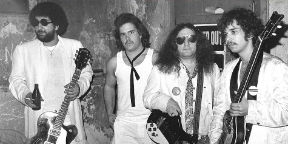 White Lines at Bookie's
White Lines at Bookie's
The Old Number 7 changed its name to the White Lines in 1979. They were especially inspired at this time by the Clash and wanted to record a single of their original songs. Although Joe wrote the majority of the lyrics, the writing partnership of he and his brother Killer was something like that of Lennon and McCartney in that one of the brothers would usually bring an idea or the start of a song to work on, and the two of them would then finish it together.
Mark Dowell left the band before they recorded the single, however. It was a case of Mark going in a different musical direction than the rest of the band, but they remained friends. He was replaced on drums by George Darany.
Dowell went on to play in a number of different bands after leaving the White Lines. He played in Duel which underwent several name changes. The group played hall parties as well as some of the same venues as the White Lines. After a few lineup changes, the band was renamed the Neighborhoods and played mostly oldies from the 50’s and 60’s. Mark Dowell gave up playing when he moved to the Traverse City area three years ago, where works as a barber. 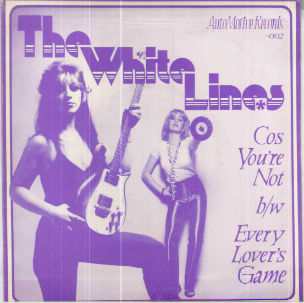 "Cos You're Not" single
"Cos You're Not" single
The White Lines went on to record Cos You’re Not and Every Lover’s Game with Eric Morgasson at Studio A in Dearborn in late 1979. Cos You’re Not generated local interest because DJ Doug Podell was playing a cassette tape of the song on radio station WWWW in Detroit and Mike Halloren was also playing it on WDET. A representative from AutoMotive Records saw the band play live and asked them if they wanted to make a record. They signed a recording contract with AutoMotive Records shortly thereafter at the Detroit offices of Brian Bukantis, founder of Goldmine magazine.
AutoMotive Records remastered the original Studio A tapes to produce the 45. The single's A-side, Cos You’re Not, was very representative of the band according to Joe, and he wrote most of it in his backyard. Inspired somewhat by the Clash, he says that the song wass angry and defiant, a reason that he didn’t perform it live that often. It also has a very distinctive lead guitar riff compliments of Killer Wail. Listen to Cos You're Not at: https://www.youtube.com/watch?v=R8oI4ps4cI8
The 45 was issued with a picture sleeve that was designed by Dennis Loren. Joe had wanted it to be in black and white, but Loren convinced them to go with purple instead so that it would be a little different from all of the black and white punk rock picture sleeves on the market. Loren lined up the two female models that were featured on the cover. 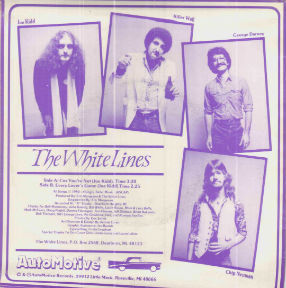
The White Lines were photographed both as a group and individually for the back cover, but Joe insisted that the individual shots be used because he realized at that point that the band was not going to stay together. Kidd, Wail, Neumann, and Darany recorded a number of other songs but none were released because the band broke up shortly after the 45 was released. Joe recalled that different things pulled the band apart; the group was going through some musical changes that caused dissension and members getting angry at each other. As a result, the White Lines ground to a halt in late 1981.
Joe Kidd moved away from music after the band broke up. He attended a Catholic seminary for a time and later got married. He continued to write songs and record them on a little 8-track recorder in his home but did not play any gigs. Joe also bought a lot of different instruments to add elements to the songs he was recording.
He and Sheila Burke first met in 2011 at a fundraising event for a mutual friend. Sheila had been singing for over thirty years in several capacities. Besides both having been involved in music for most of their lives, they discovered they had other things in common when they both performed at a fundraiser for Henry Ford Community College’s radio station one year later. 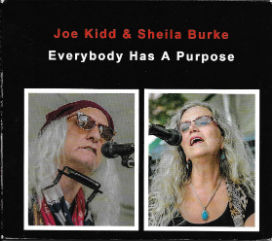 "Everybody Has A Purpose"
"Everybody Has A Purpose"
Joe’s mother was from Kentucky and his father was from West Virginia, while Sheila’s parents were from East Kentucky, near the border of West Virginia. In addition, Joe had recently lost his mother to Alzheimer’s and Sheila’s mother was dying from the same affliction. Joe invited Sheila to sing a duet on a song he had just written, and their voices blended together like they had been singing together for years.
In 2013, eight months after they decided to join together permanently, the pair won their first Detroit Music Award for Outstanding World Music Songwriters of the Year. Joe and Sheila repeated the honor in 2014. The following year, the pair received three nominations in the Gospel/Christian category. In 2016, their “Everybody Has A Purpose” album was nominated for Record of the Year in two separate categories. In addition, their song Soldiers in the Army of Mercy and Peace won a Global Music Award for Folk Song of the Year.
In June of 2017, the White Lines finished second in the online vote and were officially inducted into the Michigan Rock and Roll Legends Internet Hall of Fame. Other members of the band over the years who were not mentioned above included Duane Scalzo, Jim Aleman, Kenneth Puma, Larry Ritts, Theodore Mousouleas, Jimmy Rejc, Fred Bergeron, and Robert Mulrooney. Sadly, original band members Killer Wail (a.k.a. John Paul Joseph Jr.) passed away in 2018 and Mark Dowell passed in 2021.
MRRL Hall of Fame: https://www.michiganrockandrolllegends.com/mrrl-hall-of-fame
Sources: Interviews with Mark Dowell and Joe Kidd.
